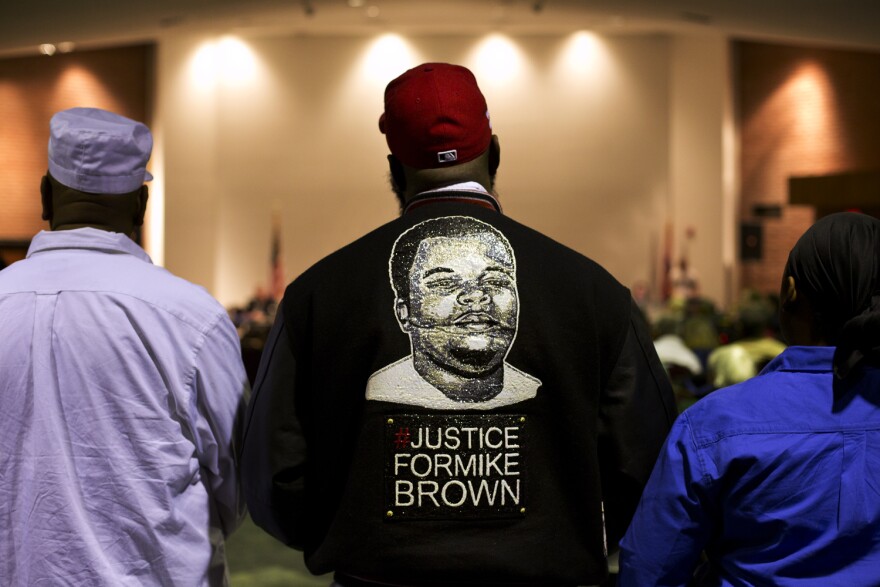On a foggy morning in Ferguson, customers trickled in and out of Sam’s Market to pick up soda pop and snacks. This small grocery story reopened last summer after being looted three times and set on fire during the riot over Michael Brown’s shooting death.
Muhammad Yaacoub, the owner of Sam’s Meat Market, says that business has been slow since he reopened last August. And despite promises of economic redevelopment, empty lots and abandoned buildings surround his business on West Florissant Avenue.
There’s a likelihood that Yaacoub could soon have to pay higher property taxes to help fill a budgetary deficit. And Yaacoub worries even higher taxes are on the way if the city signs a consent decree with the federal government.
“And more taxes, more expense, that’s going to hurt the business,” Yaacoub said. “You’re supposed to help the business, I think. We decide to open the store again, but I hope it’s not a big mistake.”
Ferguson is preparing to respond to a lawsuit from the Department of Justice that came after the city council voted to amend a consent decree. City officials contend that the cost of the 131-page agreement is too steep for the financially strapped town. And there’s concern that if the city does end up settling with the DOJ, Ferguson’s businesses and residents will have to pick up the tab.
“In this economy, people are very conscious of how they spend their money,” said Jeniece Andrews, the owner of a store called Hidden Treasures that burned down during the unrest.“A lot of people are on budgets, and Ferguson is not a wealthy area. And so, if you have your money to spend and you’re already on a budget and you know you’re being charged a higher tax, that’s less money for you to spend in your community.”
But others say Ferguson is being shortsighted — especially because the city may lose the expensive legal proceeding. And that may prolong the contention that’s gripped Ferguson for the past year and a half.
Going for broke
First, some recap: A Justice Department investigation painted a scathing picture of Ferguson’s police department and court. After months of negotiations, the DOJ presented the city with a multifaceted consent decree.

The negotiated decree would have made big changes to Ferguson’s Police Department — such as providing officers with body cameras and additional training. But city officials balked at parts of the deal, for one thing — refusing to pay officers more money. That refusal caused the Department of Justice to sue.
Asked why a city such Ferguson — population, 20,000— would want to pick a fight with the Justice Department, Ferguson Mayor James Knowles responded: We’ve been put in a situation where to sign the consent decree costs more than to fight for a better deal.
“We’re not fighting reform,” Knowles told St. Louis Public Radio reporter Rachel Lippmann. “We’ve already embraced reforms and we’re making reforms. What we’re fighting is to keep from having additional, onerous costs that really have nothing to do with constitutional policing.”
Ferguson finance officials cited an estimated cost between $9.4 million and $15.8 million over five years — compared to $4 million to $8 million to go to court. By comparison, similarly sized East Haven, Conn., estimated that it would cost about $2.8 million to pay for its consent decree.(It should be noted that East Haven has a much larger budget and more people than Ferguson.)
Even before the decree was made public, Ferguson’s City Council put property and sales tax increase on the ballot in April to fill a budgetary deficit. Knowles has said property tax and sales tax collections are down, while fine revenue has declined as well, especially after the city suspended its red light program.

Jay Kanzler is an attorney for Sam’s Meat Market and several other businesses in Ferguson. Despite big promises during the height of the unrest over Brown’s death, many redevelopment efforts have fallen through — and damaged businesses have struggled to come back to life.
“The federal government is asking the city to impose $3 million to $4 million in additional taxes each year to pay for the consent decree,” Kanzler said. “If those taxes are imposed, they have to come from somewhere. And that is sales tax that’s imposed on the businesses and then dropped down on the people and on property taxes. And those taxes will hurt businesses and they’ll hurt the people that live here."
'Cry poverty'
University of Michigan law professor Margo Schlanger says cost is often a concern for cities that sign consent decrees. But she noted that Ferguson enlisted a nationally known law firm to negotiate the decree — and that firm reportedly charges $1,300 an hour.

“Ferguson is going to spend millions of dollars. They have hired an extremely expensive lawyer to defend them,” Schlanger said. “And it’s going to be a long and complex trial. And what that means is when they plead poverty as a reason not to sign the decree, observers should think pretty carefully about that argument. Because instead of spending millions of dollars reforming their police department, the city of Ferguson is going to spend millions of dollars not reforming their police department.”
Schlanger also said that other cities that signed consent decrees ended up saving money in the long run, especially if they’re getting sued less for police misconduct. And Ferguson's decision won't necessarily save the city money if the Justice Department wins the case.
“Cities that used to get sued a lot and pay out a lot of money in settlements and in damages have found that after they implement the decrees, they pay less for insurance, they pay less in settlements and they don’t have as many damage actions,” Schlanger said. “I think that’s happened often.”
F. Willis Johnson, pastor at Ferguson’s Wellspring Church, said taking on the DOJ could not only cost the city a lot of money, but it could also prevent the city’s residents from moving past months of tumult.
“Not only has this spoken volumes about how we view residents of Ferguson who may be African American or people of color, this is equally damning to all who live in the community,” Johnson said. “If you own a home — black or white, Hispanic, Asian — the value has gone down. The sanctity of this community is in question. And more importantly, what is more discouraging is that this seems to be pervasive.
“This is the same attitude and posture and rhetoric that is being applied not only by this city council; it’s the same stupidity, ignorance, arrogance and malcontented malpractice that’s being employed by this school district,” he added, referring to the Ferguson-Florissant School District. “[And it’s being exercised] across the county by police and municipalities. That’s what should be so frightening for all of us.”
Turning back?
It’s not out of the question that Ferguson and the Department of Justice may settle on an agreement before going to a full-blown trial.

“I believe there’s a little bit of leeway where they can quickly kind of respond and say, ‘Our bad,’” Johnson said. “The city needs to do something. And its principal leader — Mayor Knowles — and the city fathers and leaders need to start in this season of Lent by repenting and saying ‘I’m sorry.’”
Kanzler, though, said the stakes are high for businesses already hanging by a thread.
“All those redevelopment plans have been shelved. None of the government agencies has reached out to help the businesses in any way,” Kanzler said. “And it’s very disappointing for these folks. There was a sense of ‘We are really with you, we are one as a region.’ Not so much now. And now to have the federal government come in and say, ‘Not only are we not helping, but we’re going to add this increased burden to the businesses and to the people of Ferguson,’ it’s almost more than they can handle.”
But for Ferguson residents like Cassandra Butler, the battle ahead is about more than just costs. As she sat in her home shortly after the Department of Justice filed its lawsuit, the longtime Ferguson resident wondered if her community could truly come together by going to legal war.
“I think this is a bigger message to parts of Ferguson who requested that the consent decree be rejected,” Butler said. “It looks like they’re getting their wish. And now they have to think about ‘is this really what they wanted?’ Because it is difficult bringing the city along to do what’s in our best interest when we’re divided as we are.”
Follow Jason Rosenbaum on Twitter: @jrosenbaum







